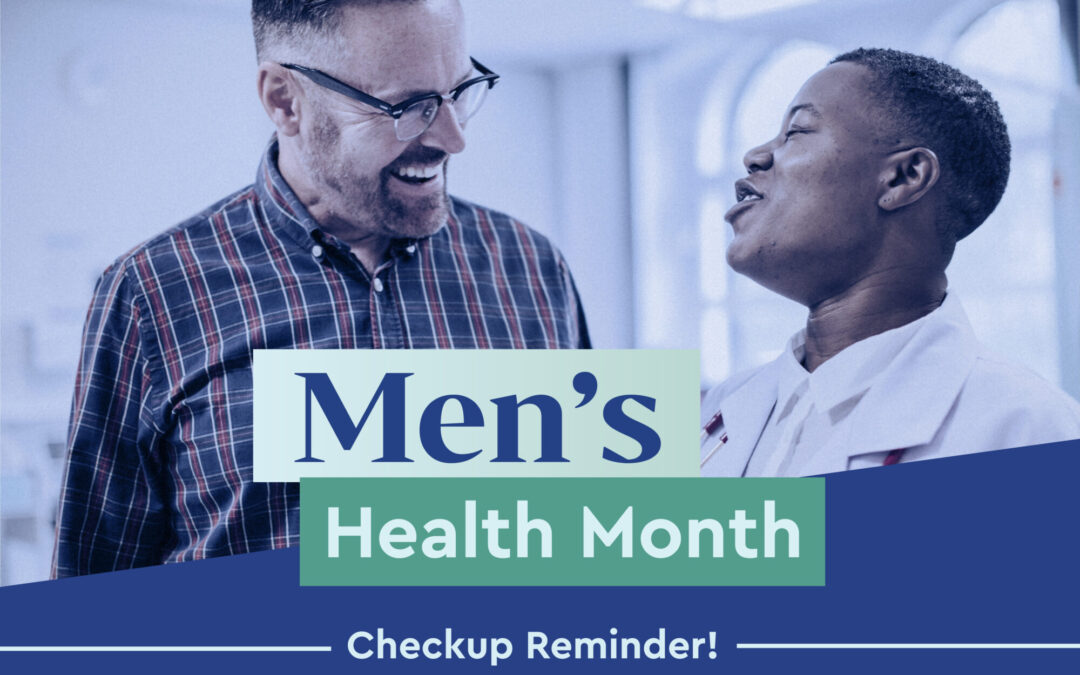Your health is too important to ignore. CareWell Medical Center can help: 973-419-5640 to make an appointment with a primary care practitioner.
Gentlemen, when was the last time you got a checkup? If you’re in your 50s, have you gotten a prostate exam? Do you maintain a healthy diet? Exercise regularly? If the answer is no to any of these questions, sadly you’re not alone. But here at CareWell Health, we’re working hard to change that.
June is Men’s Health Month , a time to “heighten the awareness of preventable health problems and encourage early detection and treatment of disease among men and boys.”
According to the Centers for Disease Control and Prevention, men in the United States:
- die on average 5 years earlier than women
- are more prone to heart disease than women, with 450,000 deaths each year
- are more prone to cancer, with more than 700,000 diagnoses each year—and 300,000 deaths.
Harvard Health Publishing, part of Harvard Medical School, found that many of these issues can be prevented by adopting healthier habits. “Many of the major health risks that men face can be prevented with a healthy lifestyle: regular exercise, a healthy diet, not smoking, stress reduction, and alcohol consumption in the moderate range (no more than 2 drinks a day) if at all. Regular checkups and screening tests can spot disease early, when it is easiest to treat.”
That means it doesn’t take much to cut down your risk factors and live healthier! A few simple, consistent adjustments to your lifestyle can make a huge difference to your quality of life.
3 Things You Can Do for Better Health Right Now:
1. Sleep More
If you skimp on sleep, you’re cheating yourself. Not getting enough sleep can lower your sex drive, hurt your immune system, contribute to gain weight, and even put you at greater risk for certain cancers and diabetes. Experts recommend getting at least 7-8 hours of sleep every night. It’s actually one of the easiest ways to live healthier.
2. Move It
Heart disease is the #1 cause of death among men. According to the Center for Disease Control, not getting enough physical activity can lead to heart disease—even for people who are otherwise healthy. A lack of exercise can also lead to obesity, high blood pressure, high blood cholesterol, and type 2 diabetes.
The good news is, even a modest amount of physical activity can help stave off heart disease. The American Heart Association recommends adults get 150 minutes (2-½ hours) of heart-pumping physical activity per week. That’s under 22 minutes per day! It can be biking, jogging, aerobic exercise…anything that causes you to break a sweat. We recommend doing something you enjoy—because you’ll be more likely to keep doing it.
3. Don’t Skip Your Doctor Visits
The Cleveland Clinic found that only 3 out of 5 American men, aged 18-70, get their physical examination every year. Over 40% of men only visit the doctor if they think they have a serious medical condition, and more than half of men said their health “wasn’t something they talk about”. The thing is, annual checkups are one of the best ways to help you stay as healthy as possible — by detecting issues earlier and putting plans in place to address them.
In addition to annual checkups, there are other doctor visits you’ll want to add to your calendar. Here are some guidelines for what you should have checked out—and when:
- Diabetes (45 years old+ and/or body mass index over 25): The American Diabetes Association recommends those 45+ and/or with a BMI above 25 being screened for diabetes. Type 2 diabetes and prediabetes symptoms can creep up without noticing much change. That’s why it’s important to get tested.
- Colon Cancer (45 years old, or 10 years prior to the age an immediate relative was diagnosed): The American Cancer Society has lowered the age for beginning colorectal screenings from 50 to 45, because colon cancer cases are on the rise among middle-aged and younger patients. If your immediate relative had colon cancer, however, screenings should start when you are 10 years younger than they were at the time of diagnosis. So if your father was diagnosed with colon cancer at age 64, you should schedule your examination at age 54. (Of course, if you have symptoms earlier than that, see your doctor immediately.) The traditional screening method is the colonoscopy, but newer take-home tests may be available. Talk to your doctor for more information.
- Prostate Cancer (around 50 years old, but ask your doctor): Prostate examinations are generally recommended to start around age 50, but every person is different. Talk to your doctor so they can guide you on the best time to start prostate screenings, based on your overall health and any family diagnosis of prostate cancer (it can run in the family).
- Depression or other Emotional Health Issues (any time you are experiencing symptoms): Too many men go without treatment for mental health issues such as depression, anxiety, or other psychological or emotional health issues. For your own health and those of your loved ones, please reach out for help anytime you are experiencing symptoms. CareWell Health offers a wide array of behavioral health services, available both in-person and via telehealth. If you’re struggling with your mental and/or emotional health, contact us today. We can help.
To make an appointment with a primary care practitioner at Contact CareWell Health Medical Center, call 973-266-8416. We’re here for you during Men’s Health Month and every month!

